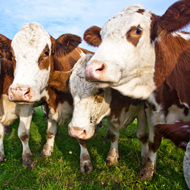
Liz Truss speaks to NFU conference
Defra will fund a roll out of the TB advisory service for farmers, making it available throughout the high risk and edge areas. The news was confirmed by secretary of state Liz Truss as she spoke to the National Farmers' Union (NFU) conference this week.
Truss also said the UK is on course to declare half of the country TB-free by 2019.
"But this is no time to ease off," she added. "I want to see culling expanded across a wider number of areas this year. The Chief Veterinary Officer’s advice is that this is the only way to secure the full benefits of our comprehensive strategy."
In light of market volatility which has seen plummeting prices for milk, pork and other products, Truss showed her support for remaining in the EU, noting that 60 per cent of food and farming exports are to the European Union, brining in £11 billion.
"At a time of severe price volatility and global market uncertainty - I believe it would be wrong to take a leap into the dark," she said. "The years of complication and risk caused by negotiating withdrawal would be a distraction from our efforts to build a world-leading food and farming industry that brings jobs and growth to Britain."
Defra is set to publish a 25-year plan for food and farming that will explain how the industry can attract skilled people, build the British brand and increase exports. It will also outline action to be taken to reduce the burden of regulation and build resilience to flooding and disease.
Investment in science will double over the next five years to £130 million. Another £80 million will fund the development of research centres for livestock, crop health, data and precision engineering. The 12 per cent increase in Defra's capital budget will allow for more spending on flood defences and resilience to animal and plant disease. Laboratories and other facilities at Weybridge are already being updated.
Truss said the aim is to give better protection to 420,000 acres of farmland by 2021.
In response to calls from the NFU, Defra will also introduce a permanent annual investment allowance this year. And from April 2016, farmers can average profits over five years rather than two. These steps are aimed at helping farmers to cope with market volatility.



 The Federation of Independent Veterinary Practices (FIVP) has announced a third season of its podcast, Practice Matters.
The Federation of Independent Veterinary Practices (FIVP) has announced a third season of its podcast, Practice Matters.